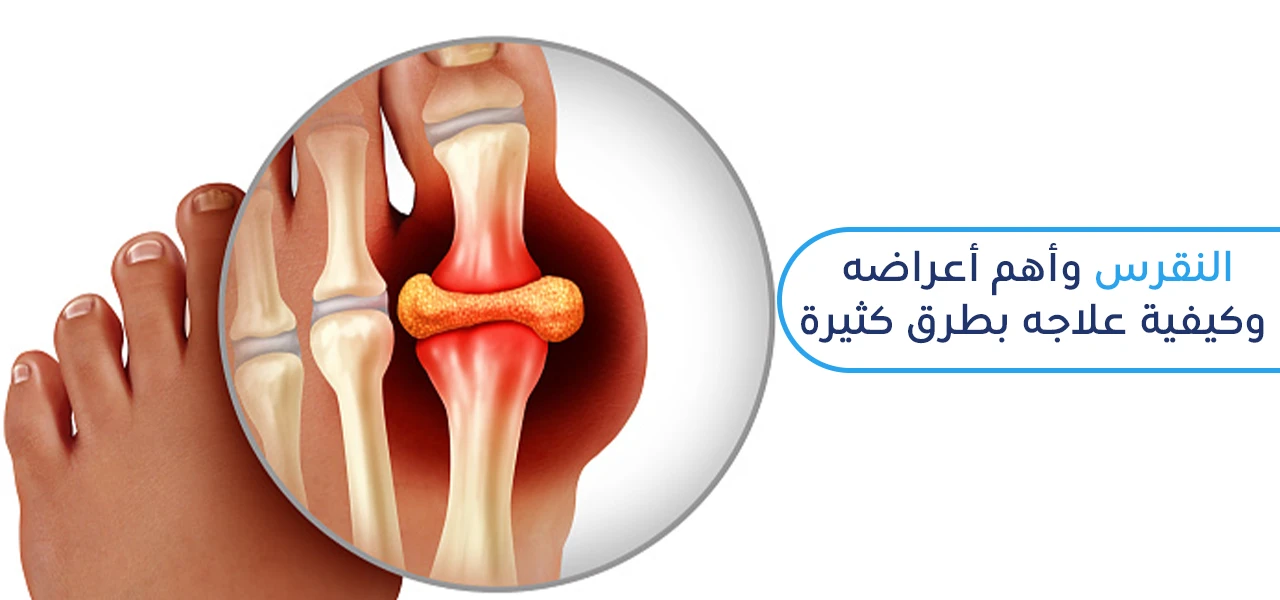Gout - Symptoms and Treatment

Today, we learn about gout, its symptoms, and how to treat it with trusted medications from Spirit Healthcare.
What is gout?
Gout, also known as King's disease, is considered one of the types of arthritis that occurs due to an increase in uric acid in the blood. It accumulates in the joint fluid, and this affects the smoothness with which the joints move. It also often affects the big toe.
Gout occurs through sudden, acute attacks in the joints, with swelling, redness, irritation, and inflammation in the joints. Gout is also one of the most common types of arthritis.
What are the main symptoms of gout?
Among the most important symptoms that frequently occur in people with the disease called gout are the following:
- Acute joint pain: Sudden, sharp pain occurs in the affected joints, and the big toe is usually the joint most affected. The pain can be very severe and increases during the night.
- Redness and swelling: The affected joint may become inflamed, swollen, and hot to the touch. Redness, coolness, and swelling may appear around the affected joint.
- Difficulty moving: Joint movement becomes difficult and painful during a gout attack. It may be difficult to walk or use the affected joint.
- Sensitivity to touch: The affected joint becomes very sensitive and hurts easily when touched or exposed to pressure.
- High temperature: Gout may be accompanied by a slight increase in temperature, especially when the attack is acute and severe.
Gout treatment from the pharmacy
There are many treatments that doctors recommend that gout patients should take continuously, to recover faster, and among these treatments are:
- Non-steroidal anti-inflammatory medications: These medications work to relieve pain and swelling caused by gout, such as Brufen 400 mg tablets, as this treatment is used in severe cases of gout.
- Medications that inhibit the enzyme xanthine oxidase: These medications are used to lower uric acid levels in the blood. Reducing the level of uric acid helps prevent recurrent gout attacks. These treatments include: Zyloric 100 mg & Zyloric 300 mg
What does a gout patient eat?
There are some nutritional recommendations that gout patients can follow to control their symptoms and prevent recurrent gout attacks, which are recommended by many doctors, including:
-
Drink sufficient amounts of water
It is recommended to drink a sufficient amount of water daily to help reduce uric acid deposits in the body and enhance its removal process.
-
Reduce your intake of red meat and fatty fish
Red meat and fatty fish contain a high percentage of purine acid, which turns into uric acid in the body, so it is recommended to reduce the intake of these foods or replace them with plant proteins such as beans, lentils, and chickpeas.
-
Avoid foods high in fructose
You should avoid eating foods and drinks that contain fructose, such as added sugars, and some types of fruits, such as grapes, berries, and mangoes, as they can increase uric acid levels in the blood.
-
Eat complex carbohydrates
Foods rich in animal proteins can be replaced with complex carbohydrates such as whole grains, vegetables and fruits with high fiber. These foods contribute to reducing uric acid levels in the blood.
-
Be careful with alcohol and prefer to avoid it
It is recommended to avoid drinking alcohol or reduce its consumption somewhat, as alcohol can increase purine acid levels in the body and lead to gout attacks.
How is gout treated with herbs?
Although some medications are claimed to be used to treat gout, some herbs affect the disease and its recovery. Some of these herbs include:
-
Hibiscus
Drinking hibiscus can help relieve arthritis associated with gout.
-
Turmeric
Turmeric contains an active substance called curcumin, which is considered an anti-inflammatory, so turmeric may have a helpful effect in alleviating symptoms associated with gout.
-
Ginger
Ginger is thought to have anti-inflammatory properties and may help relieve pain associated with gout.
-
Celery seeds
This is because celery seeds have shown proven and noticeable results in treating gout, despite the scarcity of scientific research.
-
Parsley
Parsley and its main components, which are flavonols, can significantly reduce levels of uric acid in cases of high levels.
What is a gout analysis?
The gout analysis aims to diagnose the disease and evaluate the levels of uric acid in the body. There are many tests that a person can perform to determine his condition of gout, including:
- Urinalysis: It is used to measure the level of uric acid in the urine and diagnose gout.
- Blood test: The level of uric acid in the blood is measured. High levels of uric acid can be an indicator of the presence of gout, but it should be noted that uric acid levels can also be high in people who do not suffer from gout.
- X-ray imaging: X-ray imaging is used to detect the presence of urate stone deposits in affected joints. X-ray imaging may also show inflammation or bone changes associated with gout.
Here in this article, we have presented to you all the information related to gout, as many people are asking a lot about this topic.
We have also provided you with the most important treatments for gout, which you can obtain from Spirit Pharmacy, the best online pharmacy in Kuwait, as we hope to be. We have provided you with this information.
